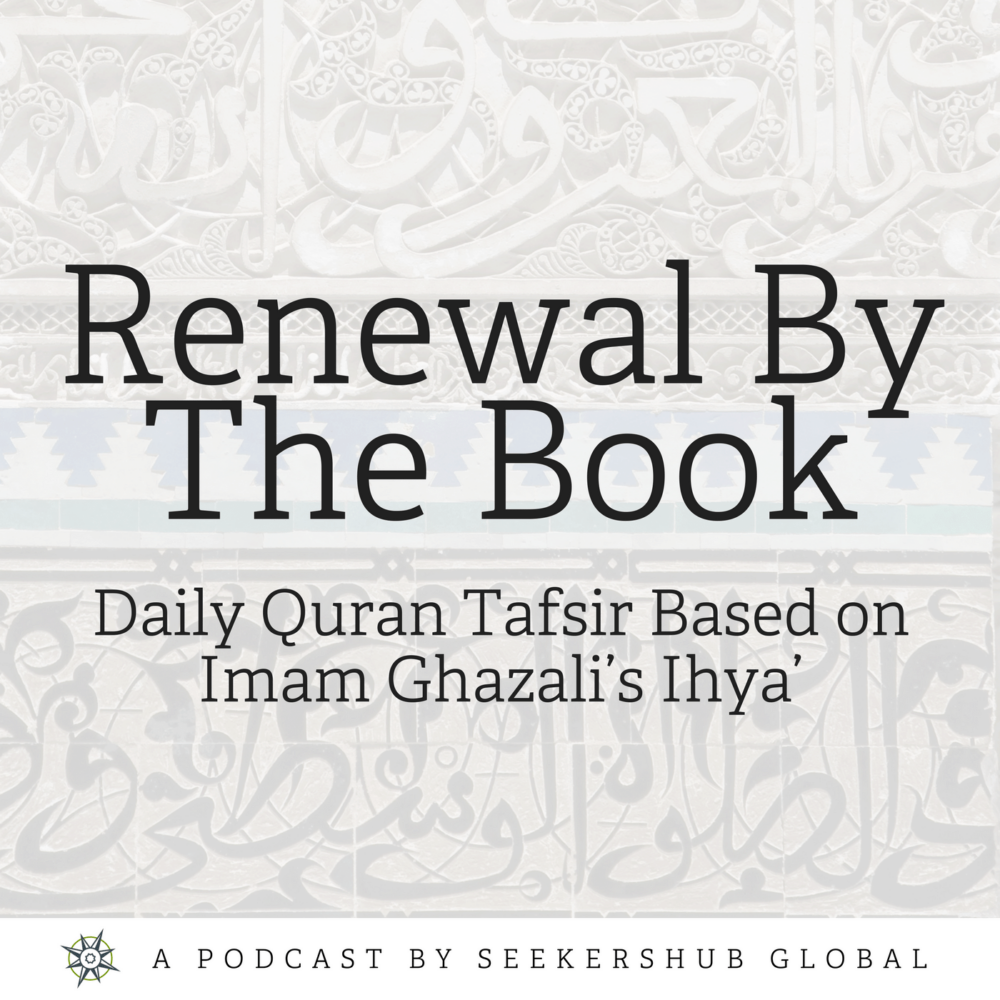07: Hajj – Renewal by the Book: Quran Tafsir Based on Imam Ghazali’s Ihya – Shaykh Faraz Rabbani
Podcast: Play in new window | Download (14.0MB)
In this lesson, Shaykh Faraz looks at the key verses in the Quran related to Hajj, corresponding to the seventh chapter of Imam Ghazali’s Ihya. He highlights the verses 27-32 from Surah Al-Hajj, which outline the meaning and purpose of Hajj.
وَأَذِّن فِى ٱلنَّاسِ بِٱلْحَجِّ يَأْتُوكَ رِجَالًا وَعَلَىٰ كُلِّ ضَامِرٍ يَأْتِينَ مِن كُلِّ فَجٍّ عَمِيقٍ
لِّيَشْهَدُوا۟ مَنَٰفِعَ لَهُمْ وَيَذْكُرُوا۟ ٱسْمَ ٱللَّهِ فِىٓ أَيَّامٍ مَّعْلُومَٰتٍ عَلَىٰ مَا رَزَقَهُم مِّنۢ بَهِيمَةِ ٱلْأَنْعَٰمِ ۖ فَكُلُوا۟ مِنْهَا وَأَطْعِمُوا۟ ٱلْبَآئِسَ ٱلْفَقِيرَ
“Proclaim the pilgrimage to all people, they will come to you on foot and they’ll come on all kind of mount emerging from every deep mountain pass. In order to witness all kinds of benefits for them and in order to remember the name of Allah for a known number of days for what Allah has provided for them. So feed yourself of that livestock and give to feed the destitute and the unfortunate… “ [Quran 22, 27-28]
In these verses Allah tells us some of the spiritual aims of Hajj. The Pilgrimage has many acts of worship each of which has its own benefits. Each act is done out of submission to Allah and to the extent to which it is done with that intention you will find benefit in it.
People with respect to Hajj are of 3 types:
[1] Those who go to Hajj unprepared and that is foolishness, they gain some benefit but miss out on a lot.
[2] Those who prepare outwardly only for the Hajj, and that is important.
[3] Those who prepare outwardly but also understand why they are doing it. One should prepare well advance to Hajj.
One of the highly recommended resources for this is Imam Ghazali’s Chapter on Hajj (or as translated in the book Inner Dimensions of Islamic Worship) that details the spiritual benefits of Hajj.
Imam Al-Ghazali describes Hajj as a reenactment of resurrection and the Hereafter or as a reenactment of the various challenges of life. The metaphor of tawaf is a metaphor of love so throughout our day we keep turning towards the One we love through prayer. However, the believer wants to express more fully the nature of their love to Allah and the Hajj expresses that.
ثُمَّ لْيَقْضُوا۟ تَفَثَهُمْ وَلْيُوفُوا۟ نُذُورَهُمْ وَلْيَطَّوَّفُوا۟ بِٱلْبَيْتِ ٱلْعَتِيقِ
ذَٰلِكَ وَمَن يُعَظِّمْ حُرُمَٰتِ ٱللَّهِ فَهُوَ خَيْرٌ لَّهُۥ عِندَ رَبِّهِۦ ۗ وَأُحِلَّتْ لَكُمُ ٱلْأَنْعَٰمُ إِلَّا مَا يُتْلَىٰ عَلَيْكُمْ ۖ فَٱجْتَنِبُوا۟ ٱلرِّجْسَ مِنَ ٱلْأَوْثَٰنِ وَٱجْتَنِبُوا۟ قَوْلَ ٱلزُّورِ
“so let the pilgrims perform their acts of cleansing, fulfil their vows, and circle around the Ancient House.”
“All this [is ordained by God]: anyone who honors the sacred ordinances of God will have good rewards from His Lord…” [Quran 22, 29-30]
In these verses Allah reminds us that this is a devotional act and that we are servants to Allah as such we carry out the acts of devotion in the way He ordained not in the ways we prefer.
حُنَفَآءَ لِلَّهِ غَيْرَ مُشْرِكِينَ بِهِۦ ۚ وَمَن يُشْرِكْ بِٱللَّهِ فَكَأَنَّمَا خَرَّ مِنَ ٱلسَّمَآءِ فَتَخْطَفُهُ ٱلطَّيْرُ أَوْ تَهْوِى بِهِ ٱلرِّيحُ فِى مَكَانٍ سَحِيقٍ
ذَٰلِكَ وَمَن يُعَظِّمْ شَعَٰٓئِرَ ٱللَّهِ فَإِنَّهَا مِن تَقْوَى ٱلْقُلُوبِ
“Steadfastly upright for Allah, not associating any with Him. And he who associates with Allah – it is as though he had fallen from the sky and was snatched by birds or the wind carried him down into a remote place. That [is so]. And whoever honors the signs of Allah – indeed it is from the piety of the hearts.” [Quran 22, 31-32]
In closing, verses 31 and 32 are a description of what is at the heart of partaking in Hajj embodied by the one who built the Ka’ba, Prophet Ibrahim. He was upright in his devotion to Allah. The Haneef is the one who seeks Allah in all that they do. The lesson of Hajj is to make your whole life revolve around Allah. The requirement of that is outlined in the last verse: to have taqwa of Allah through considering everything that has a relation to Allah to be great and in particular the manifest signs of Allah.
For a more detailed explanation of the actions of Hajj by Imam Al-Junaid and how to attain a ‘True Hajj’ please visit this blog post: https://seekers.flywheelstaging.com/articles/general-artices/true-hajj/
In this series Shaykh Faraz will be looking at points of reflection from key verses in the Quran. The series will follow the thematic order of Imam Ghazali’s Ihya Ulum al-Din (Renewing the Religious Sciences). The aim is to connect the key verses of guidance from the Book of Allah with the blueprint of renewal, the Ihya, so that we experience a renewal by The Book.
Join our Ramadan 2017 program: #RamadanRenewal, in-person at SeekersGuidance Toronto or online through the SeekersGuidance Global platform. For more details, visit: https://seekers.flywheelstaging.com/ramadan.
Checkout all of the SeekersGuidance podcasts by visiting https://seekers.flywheelstaging.com/podcasts/
